Featured Posts

- Index of Psychological Studies of Presidents and Other Leaders Conducted at the Unit for the Study of Personality in Politics
- The Personality Profile of U.S. Supreme Court Associate Justice Brett Kavanaugh
- The Leadership Style of North Korean Leader Kim Jong-un
- North Korea Threat Assessment: The Psychological Profile of Kim Jong-un
- Russia Threat Assessment: Psychological Profile of Vladimir Putin
- The Personality Profile of 2016 Republican Presidential Candidate Donald Trump
- Donald Trump's Narcissism Is Not the Main Issue
- New Website on the Psychology of Politics
- Unit for the Study of Personality in Politics --- 'Media Tipsheet'
categories

- Afghanistan (228)
- Al Gore (2)
- Amy Klobuchar (4)
- Ayman al-Zawahiri (7)
- Barack Obama (60)
- Ben Carson (2)
- Bernie Sanders (7)
- Beto O'Rourke (3)
- Bill Clinton (4)
- Bob Dole (2)
- Campaign log (109)
- Chris Christie (2)
- Chuck Hagel (7)
- Criminal profiles (8)
- Dick Cheney (11)
- Domestic resistance movements (21)
- Donald Trump (31)
- Economy (33)
- Elizabeth Warren (4)
- Environment (24)
- George H. W. Bush (1)
- George W. Bush (21)
- Hillary Clinton (9)
- Immigration (39)
- Iran (43)
- Iraq (258)
- Jeb Bush (3)
- Joe Biden (13)
- John Edwards (2)
- John Kasich (2)
- John Kerry (1)
- John McCain (7)
- Kamala Harris (5)
- Kim Jong-il (3)
- Kim Jong-un (11)
- Law enforcement (25)
- Libya (18)
- Mahmoud Ahmadinejad (6)
- Marco Rubio (2)
- Michael Bloomberg (1)
- Michele Bachmann (173)
- Mike Pence (3)
- Military casualties (234)
- Missing person cases (37)
- Mitt Romney (13)
- Muqtada al-Sadr (10)
- Muslim Brotherhood (6)
- National security (16)
- Nelson Mandela (4)
- News (5)
- North Korea (36)
- Osama bin Laden (19)
- Pakistan (49)
- Personal log (25)
- Pete Buttigieg (4)
- Presidential candidates (19)
- Religious persecution (11)
- Rick Perry (3)
- Rick Santorum (2)
- Robert Mugabe (2)
- Rudy Giuliani (4)
- Russia (7)
- Sarah Palin (7)
- Scott Walker (2)
- Somalia (20)
- Supreme Court (4)
- Syria (5)
- Ted Cruz (4)
- Terrorism (65)
- Tim Pawlenty (8)
- Tom Horner (14)
- Tributes (40)
- Uncategorized (50)
- Vladimir Putin (4)
- Xi Jinping (2)
- Yemen (24)
Links

archives

- November 2021
- January 2021
- November 2020
- October 2020
- September 2020
- August 2020
- July 2020
- April 2020
- March 2020
- February 2020
- January 2020
- December 2019
- October 2019
- July 2019
- May 2019
- April 2019
- March 2019
- February 2019
- January 2019
- December 2018
- September 2018
- August 2018
- July 2018
- June 2018
- April 2018
- March 2018
- February 2018
- January 2018
- August 2017
- July 2017
- June 2017
- May 2017
- April 2017
- February 2017
- January 2017
- December 2016
- November 2016
- October 2016
- September 2016
- August 2016
- July 2016
- June 2016
- May 2016
- April 2016
- March 2016
- February 2016
- January 2016
- December 2015
- November 2015
- October 2015
- September 2015
- August 2015
- July 2015
- June 2015
- May 2015
- April 2015
- March 2015
- February 2015
- January 2015
- December 2014
- November 2014
- October 2014
- September 2014
- August 2014
- July 2014
- June 2014
- May 2014
- April 2014
- March 2014
- February 2014
- January 2014
- December 2013
- November 2013
- October 2013
- September 2013
- August 2013
- July 2013
- June 2013
- May 2013
- April 2013
- March 2013
- February 2013
- January 2013
- December 2012
- November 2012
- October 2012
- September 2012
- August 2012
- July 2012
- June 2012
- May 2012
- April 2012
- March 2012
- February 2012
- January 2012
- December 2011
- November 2011
- October 2011
- September 2011
- August 2011
- July 2011
- June 2011
- May 2011
- April 2011
- March 2011
- February 2011
- January 2011
- December 2010
- November 2010
- October 2010
- September 2010
- August 2010
- July 2010
- June 2010
- May 2010
- April 2010
- March 2010
- February 2010
- January 2010
- December 2009
- November 2009
- October 2009
- September 2009
- August 2009
- July 2009
- June 2009
- May 2009
- April 2009
- March 2009
- February 2009
- January 2009
- December 2008
- November 2008
- October 2008
- September 2008
- August 2008
- July 2008
meta

Research conducted at the Unit for the Study of Personality in Politics under the direction of Aubrey Immelman, Ph.D., offers a political-psychological explanation for Donald Trump’s personal appeal as a candidate and Jeb Bush’s inability to consolidate his erstwhile front-runner status in the 2016 U.S. presidential election Republican primary.
Following is a summary of the major findings of the study, as published in an opinion column in the St. Cloud Times.
——————————————————————
Why Bush Gets Trumped in the Polls
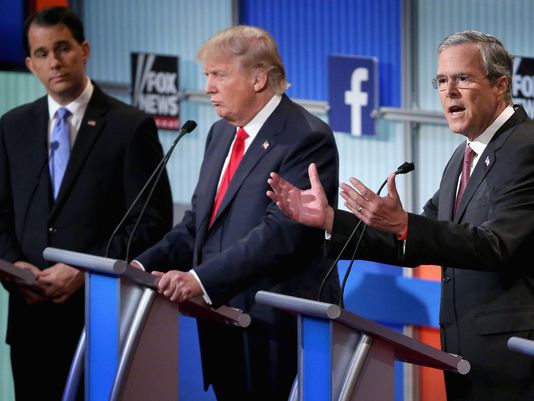
Donald Trump, center, has led the charge against Jeb Bush, right, who is also well-funded and considered one of the favorites. Jeb Bush fields a question in the Aug. 6 Fox News debate as Wisconsin Gov. Scott Walker and Donald Trump look on. (Photo: Chip Somodevilla / Getty Images)
By Aubrey Immelman
St. Cloud Times
August 23, 2015
The first national polls since the Aug. 6 Fox News debate show Donald Trump solidifying his lead over erstwhile front-runner Jeb Bush among likely Republican primary voters.
Fox News reported 25 percent Trump to 9 percent Bush, and CNN reported 24 percent to 13 percent.
As Vox Policy & Politics noted Aug. 19, “Jeb Bush planned to win the Republican primary with a shock-and-awe strategy. Instead, it’s been a shocking fall for the onetime GOP frontrunner. He started the campaign with the most famous name in Republican politics, a $100 million-plus stake, and clear, if underwhelming, favorite status in early polling. But Bush has fallen fastest and farthest against the backdrop of Donald Trump’s rise.â€
Failed political punditry
Political pundits and TV talking heads, initially dismissive about Trump’s candidacy, have flailed and floundered to offer a plausible explanation for the real-estate mogul’s spectacular surge in the presidential primary stakes.
The Vox report offers a representative sampling: Bush seems too much of a political insider; the establishment wing of the GOP isn’t sold on Bush; conservatives don’t trust Bush; and Bush is bland and boring on the campaign trail.
With the exception of the latter, none of the above rationales offers an adequate explanation, save possibly on the margins. The real reason for Bush’s fading presidential prospects is his bland persona — particularly in contrast to Trump’s star power.
That is the conclusion I reached in an effort to come to grips with Trump’s appeal after consulting a measure I developed about 20 years ago to predict the winner in presidential elections prior to Super Tuesday.
This heuristic model, developed in the Unit for the Study of Personality in Politics at St. John’s University and the College of St. Benedict, employs candidate personality traits, as publicly perceived, to predict which contender will resonate most favorably with voters.
A caveat: The model is designed for general elections, where independent and so-called “low-information†voters — many of whom base their choice on the candidate’s personal appeal rather than party-political affiliation — hold the balance of power. Those dynamics are not necessarily in play during the primary process, which tends to be driven by partisan “base†voters.
Perception drives choice
My research on the psychology of politics, spanning more than a quarter century, reveals voters respond favorably to candidates that are outgoing, self-confident and dominant; and negatively to candidates that are introverted and overly conscientious.
Take Bill Clinton, to date the highest-scoring presidential candidate on my “Personal Electability Index.†Clinton is among the most outgoing, confident, energetic personalities I have studied — not in the least socially aloof and more undisciplined than conscientious.
That distinction goes to the worst-scoring presidential candidate I have profiled: Al Gore, with a PEI score of minus 17. Conscientiousness is a desirable quality in a president, but on the campaign trail it feeds public perception of the candidate as stiff and formal, pedantic and boring.
Similarly, introversion can be an asset in office, permitting sustained focus on the task at hand, but to voters, excessive introversion comes across as bland and “wooden.â€
Trump vs. Bush
Of the three personal qualities that appeal to voters — extroversion, self-confidence (narcissism), and dominance — Trump trumps Bush on all three, by a New York mile.
On the two attributes that diminish a candidate’s personal appeal — introversion and conscientiousness — Bush takes Trump to the cleaners. Unfortunately for Bush, what would be a personal strength in the White House leaves the average voter cold.
The personality score sheet shows Trump defeats Bush decisively with a PEI score of 62 to minus 3. That’s minus 3, the worst score since Al Gore.
For historical perspective, here are my personality-based electability numbers for all major-party nominees since 1996, published before Super Tuesday in presidential election years, with the successful candidate or incumbent listed first. In addition, selected candidates in the current election cycle are listed in descending order of PEI scores::
- 1996: Bill Clinton 37, Bob Dole 15
- 2000: George W. Bush 31, Al Gore -17
- 2004: George W. Bush 31, John Kerry 9
- 2008: Barack Obama 28, John McCain 26
- 2012: Barack Obama 10, Mitt Romney 6
- 2016: Donald Trump 62, Hillary Clinton 23, Jeb Bush -3
So personality does matter, at least for now. But only time will tell how prominently character will figure in this election cycle; a broad array of personal and situational factors will be in play.
Will Trump’s inflated confidence cause him to overreach and self-destruct? Will Clinton’s deleted emails serve to wipe her off the election ballot? Will Bush’s political connections and considerable campaign war chest carry him through?
Stay tuned and watch this space.
This is the opinion of Aubrey Immelman, associate professor of psychology at the College of St. Benedict and St. John’s University, where he directs a faculty-student collaborative research program in political psychology, the Unit for the Study of Personality in Politics.
——————————
Commentary

Jeb Bush’s extraordinarily low rating of -3 on the Personal Electability Index, which has accurately predicted the outcome of every presidential election since 1996), ranks near the bottom among presidential candidates I’ve studied in the past five presidential election cycles.
Compared with recent presidential candidates that most closely resemble Bush, Bush’s PEI score is marginally worse than Mitt Romney’s lackluster score of 6, though considerably better than Al Gore’s record-low score of -17.
Donald Trump, in contrast, obtained a higher PEI score than any presidential candidate since I started employing the heuristic in 1996. Of all major-party nominees since 1996, Trump most closely resembles Bill Clinton (the previous PEI leader with a score of 37), though Trump is considerably more dominant than Clinton.
Caveat: Trump’s inordinately high PEI score of 62 in large part is accounted for by extreme MIDC scale elevations on on scale 1A (which measures dominance) and scale 2 (a measure of narcissism). In my opinion, a PEI correction factor may need to be instituted for scale elevations of that order. (The PEI already contains a correction factor for scale 6, where a candidate is not penalized for the first four points of MIDC scale elevation on conscientiousness.)
Following are the PEI calculations for Jeb Bush and Donald Trump.
Jeb Bush: PEI = (–)3
Scale:Â Â 1AÂ Â Â 1BÂ Â Â 2Â Â Â 3Â Â Â 4Â Â Â 5AÂ Â Â 5BÂ Â Â 6Â Â Â 7Â Â Â 8
Score:Â Â Â 9Â Â Â Â Â 3Â Â Â Â Â 8Â Â Â 1Â Â 5Â Â Â Â Â 1Â Â Â Â 5Â Â Â 15Â Â 4Â 10
Scale: 1A = 9; 2 = 8; 3 = 1; 6 = 15; 8 = 10
[Extraversion (scale 3) = 1] + [Narcissism (scale 2) = 8] + [Dominance (scale 1) = 9] – [Introversion (scale 8) = 10] – [Conscientiousness (scale 6) = (15 – 4) = 11] = 18 – 21 = (-)3
Donald Trump: PEI = 62
Scale:Â Â 1AÂ Â Â 1BÂ Â Â 2Â Â Â 3Â Â Â 4Â Â Â 5AÂ Â Â 5BÂ Â Â 6Â Â Â 7Â Â Â 8
Score:Â Â 19Â Â Â 11Â 24Â 19Â Â 1Â Â Â Â Â 0Â Â Â Â Â Â 6Â Â Â Â 2Â Â Â 1Â Â 0
Scale: 1A = 19; 2 = 24; 3 =19; 6 = 2; 8 = 0
[Extraversion (scale 3) = 19] + [Narcissism (scale 2) = 24] + [Dominance (scale 1) = 19] – [Introversion (scale 8) = 0] – [Conscientiousness (scale 6) = (2 – 2) = 0] = 62 – 0 = 62
Dysfunctionality adjusted
[Extraversion (scale 3) = 15] + [Narcissism (scale 2) = 15] + [Dominance (scale 1) = 15] – [Introversion (scale 8) = 0] – [Conscientiousness (scale 6) = (2 – 2) = 0] = 45 – 0 = 45
—————————————————
Updates: Related interest
—————————————————
Real Clear Politics Poll Average — July-August 2015
On June 15, Jeb Bush led all Republican contenders with 10.8% in the Real Clear Politics poll average, with Donald Trump in 9th place at 3.6%.
A month later, on July 16, Trump (15%), had drawn even with front-runner Bush (15.5%).
By July 20, Trump (16.8%) had overtaken Bush (14.6%) for the lead.
By the end of the summer, on Aug. 31, Trump (25.7%) had jumped to a comfortable lead over Bush (9.7%), who had dropped to third place behind Ben Carson.
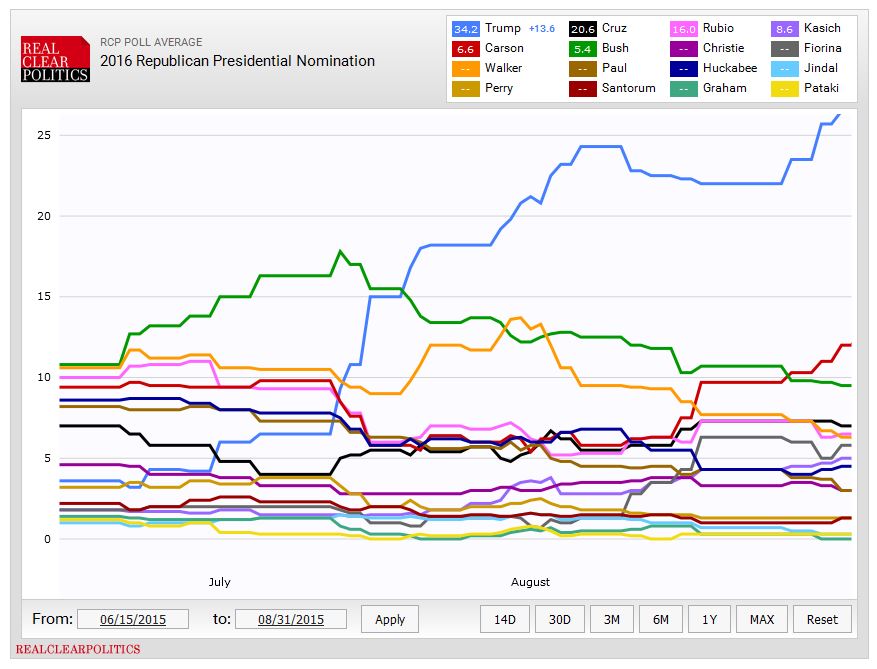
Click on image for larger view
————————————————————
Pollsters Dumbfounded by Trump
By Ben Kamisar
![]()
August 27, 2015
Excerpt
Polling experts agree on one thing when it comes to Donald Trump’s presidential run: They’ve never seen anything like it.
The billionaire businessman’s dominance of the Republican presidential race is forcing experienced political hands to question whether everything they know about winning the White House is wrong.
The shocks have come in quick succession, with Trump first rocketing to the top of national polls, and then taking double-digit leads in the early voting states of Iowa, New Hampshire and South Carolina.
In another act of political magic, Trump managed to flip his favorability rating from negative to positive in one poll during the span of a month — a feat that Monmouth University’s Patrick Murray called “astounding.â€
“That defies any rule in presidential politics that I’ve ever seen,†Murray, the director Monmouth’s Polling Institute, told The Hill.
Trump’s favorability rose from 20 percent to 52 percent among Republican voters between July and August, Monmouth found. …
—————————————————————————————
5 Reasons Bush Isn’t Freaking Out About Trump
By Marc Caputo and Anna Palmer
![]()
August 21, 2015
Excerpts
… Despite Donald Trump shooting ahead in the polls and Bush’s debate performance getting bad reviews — and amid signs of frustration on the campaign trail from the former Florida governor himself — his supporters aren’t panicking, multiple sources close to the candidate insist. The Bush camp is projecting confidence that the Summer of Trump will fade to winter, and that Jeb will prevail when it matters.
Here are five reasons Jebworld isn’t freaking out:
1. ‘Trump v. Somebody’
… Before Trump soared, Bush was on top. But while Trump’s climb has corresponded with Bush’s fall, Bush hasn’t crashed to earth. …
“It’s going to come down to Trump v. Somebody and Jeb is the somebody,†said one consultant who has worked for Bush, summing up the thinking inside his orbit.
… The more the press focuses on Trump v. Bush, the calculation goes, the less attention the lesser candidates get, starving them of oxygen. A two-man race is good for Jeb. …
2. Jeb, Inc.
By any measure, the roughly $120 million amassed by Bush’s campaign, super PAC and leadership PAC is as stunning as it is life-sustaining for the candidate. Money doesn’t buy love in an election, but it puts a down payment on it. And Bush’s camp is about to spread the love. …
3. Bush, Inc.
Before there was Jeb, Inc. 2016, there was Bush, Inc. His grandfather was a U.S. senator; his father and brother were presidents. No other family in modern America has wielded such political power and had such ties to the GOP establishment and Wall Street, where he reestablished relations after leaving the governor’s mansion in 2007. Membership has its privileges. About half of Bush’s total $120 million haul came from donors who previously gave to his brother or father, a recent Associated Press analysis found.
These aren’t small donors — they’re millionaires, billionaires, major CEOs and former ambassadors. Not only are they loyal to the Bush dynasty, they’ve seen insurgent candidates flare up before and aren’t spooked by Trump, unlike some of the less experienced contributors to some of the other campaigns. …
4. The Bush Record
Underpinning Jeb, Inc.’s belief in its candidate is that no other Republican candidate can match his record as governor. …
This is “the Florida story†that Jeb, Inc. has already started to tell. The campaign and his backers say that, in the end, most Republican voters don’t know it and only identify Bush as the son and brother of former presidents. And Bush supporters are counting on Bush’s long history of working to elect Republicans — in contrast to Trump, who has supported and contributed to Democrats. …
5. Bush Time
With all that money and institutional support, Bush’s team says it’s secure because it has the luxury of time. Though he’s now in second place, Bush isn’t fending off daily questions about his longterm viability. Bush has compared himself to the slow, plodding tortoise in Aesop’s fable. …
———————————
9/16/2015 Update
Nate Silver: Trump Has About 5% Chance of Winning
[GOP nomination]
![]()
September 15, 2015
Statistician and writer Nate Silver joins Anderson Cooper to share his evaluation of the Trump campaign.
ANDERSON COOPER, CNN: Our next guest made his reputation by picking the right polling data … to make much more accurate predictions, extremely accurate predictions. Nate Silver, FiveThirtyEight.com joins us tonight to talk about what the numbers can and can’t say right now about the state of the race.
So it’s really fascinating because you put the chance of Donald Trump or Ben Carson actually getting the GOP nomination and put it around 5 percent.
NATE SILVER, FIVETHIRTYEIGHT: Maybe about 5 percent each, somewhere around there.
COOPER: Why so low?
SILVER: So there are couple things to think about. One is that if you look back at history, you’ve never seen candidates like Donald Trump certainly or Ben Carson win a party nomination. And secondly, if you look at the polling, a lot of times a candidate who is leading the polls now mid-September didn’t win the nomination, didn’t even come close. I think … people forget that polls five months before Iowa historically have told you very, very little. …
————————————
10/22/2015 Update
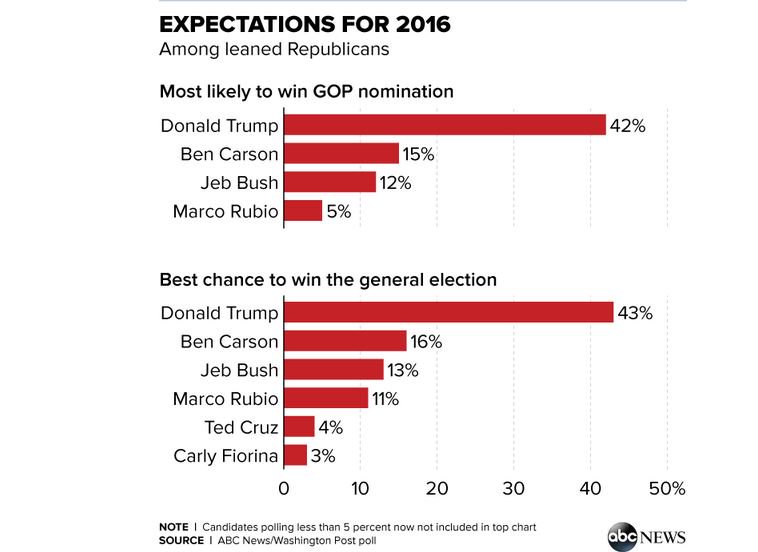
————————————
10/31/2015 Update
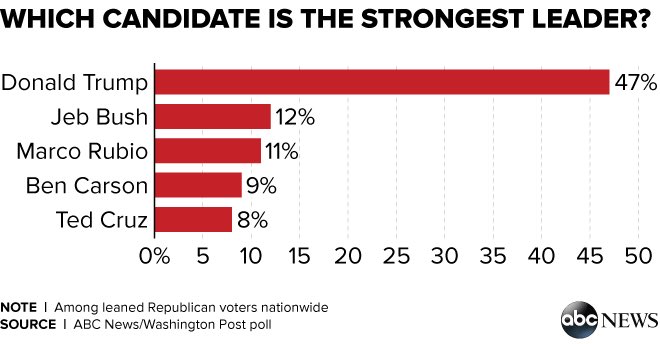
————————————
2/12/2016 Update
Here Are Some of the Absolute Worst Predictions of the 2016 Race So Far
![]() By Katherine Krueger
By Katherine Krueger
Talking Points Memo
February 10, 2016
Excerpts
It’s been a long, protracted election season so far, which has allowed ample time for pundits on both sides of the aisle to make very bad, authoritative predictions about the 2016 race. …
Here are just a few of the worst 2016 predictions that pundits and journalists have made so far this election cycle.
That Walker would be a top-tier candidate
After Gov. Scott Walker became a conservative darling for going toe-to-toe with public sector unions in Wisconsin, he immediately started crisscrossing the country to kiss major donors’ rings in preparation for a White House bid.
The governor’s momentum was enough for scores of politicos to put good odds on his chances, with some going so far as to declare he would be the GOP nominee, while The Hill ranked Walker second on its list of the top 10 most likely GOP nominees. …
That Trump would flame out early
Conservative pundit Bill Kristol, who has a long, hackish history of being patently wrong, took on new relevance in 2016 as a reliable engine for pumping out fantastically bad predictions about Donald Trump and the Republican race. …
After the first Republican presidential debate in August, Fox News contributor Charles Krauthammer said Trump was clearly “out of place†and his opponents “left him out in the cold.â€
The Huffington Post infamously announced plans last summer to cover Trump only in its entertainment vertical, calling the billionaire’s campaign “a sideshow.†They torpedoed the stunt only after months of Trump polling at the front of the GOP pack, but the Republican frontrunner still draws the site’s ire. HuffPost splashed the oversized headline “NH GOES RACIST SEXIST XENOPHOBIC†across its front page after Trump won the New Hampshire primary.
Ezra Klein, the politics wunderkind and founder of Vox Media, is still on board with Trump losing, and compared his candidacy to Howard Dean’s failed 2004 run: “Trump could just … not win.â€
Chris Cillizza, editor of The Fix politics blog at The Washington Post, jumped on the Trump-as-gag-candidate bandwagon early. In a February 2015 piece with the already-back-pedaling headline “Donald Trump might be serious about running for president. He’s still irrelevant,†Cillizza declared: “So, let’s assume – gulp – that Trump is serious this time around. Heck, while we’re at it, let’s assume he actually runs. IT. DOESN’T. MATTER.”
When Cilizza ranked the GOP’s top 10 prospects in May, Trump didn’t make the cut (and only four of those 10 are still in the race at all). In a piece published the day before the New Hampshire primary, Cillizza observed Trump has campaigned “masterfully†but still demurred on the question of whether the real estate mogul was “built for the long haul†of securing the party’s nomination.
Discounting Sanders as a political curiosity
Serving as the compliment to the conventional wisdom that Hillary Clinton would be the inevitable Democratic presidential nominee, Sen. Ben Sanders’ (I-VT) viability as a candidate also was seriously underestimated.
The political predictions site Sabato’s Crystal Ball classifed Sanders as a “gadfly†third tier candidate in its May horse race, grouping him in with ex-Maryland Gov. Martin O’Malley, ex-Sen. Jim Webb (D-VA), and ex-Rhode Island Gov. Lincoln Chafee, all of whom have since dropped out of the race. …
Bloomberg’s Mark Halperin, the “Game Change†co-author who recently parlayed a much-maligned politics TV show into a Showtime deal, wrote in October that Clinton could have the nomination locked up by Feb. 8. That ruling was obliterated by Sanders’ monster victory in New Hampshire. …
Jeb! will be the GOP nominee. Period.
It’s difficult to know where to start with the legions of pundits who trafficked in the prevailing wisdom that former Florida Gov. Jeb Bush would dominate the GOP field and enjoy smooth sailing en route to the party’s nomination.
Feverish reporting around Bush’s early fundraising numbers, paired with a spate of big-ticket campaign hires, was enough for many commentators to suggest that no other upstart Republican could stop the Bush machine from rolling to November.
How far the mighty fall. While Bush managed a fourth place finish in New Hampshire, he garnered a bleak 3 percent in the Iowa caucuses, an honor for which he reportedly spent nearly $3,000 per vote. …
Paul as savior of the Republican Party
Despite torrents of media coverage around Sen. Rand Paul (R-KY) as the party’s great libertarian hope—the man able to unite the far-right tea party factions and the pierced and tattooed millennials—the candidate’s largely obscure campaign failed to get traction in 2016. …
In a 2013 episode of “Hardball,†MSNBC’s Chris Matthews predicted in no uncertain terms that Paul would be the GOP’s man in 2016.
“I predict the hard right is going to take over the Republican party in 2016, and the nomination is going to Rand Paul,†Matthews told viewers. “You watch, I do this for a living.†…
———————————
2/16/2016 Update
Donald Trump Will Be G.O.P. Nominee, Students’ Mock Convention Says
By Nicholas Fandos

February 13, 2016
Excerpts
A gymnasium full of college students … [predicted] that Donald J. Trump, the business tycoon who has never held elected office, would win the Republican nomination with more than twice as many delegates as the runner-up, Senator Ted Cruz of Texas.
For a political culture awash with polls and punditry, the mock convention at Washington and Lee University offers one of the most meticulous and intriguing predictions of its kind, having successfully forecast the nominee of the party not in the White House in 19 of 25 attempts, including all but two since 1948. …
In the end, Mr. Trump earned 1,320 delegates, Mr. Cruz 652 and Senator Marco Rubio of Florida 399. No other candidate topped 100 delegates.
The prediction is a serious matter on this history-soaked campus, where students have hosted a mock convention every four years since 1908. Designed to predict the nominee of the party not currently in the White House, it draws alumni and prominent politicians from around the country. …
Full report at the New York Times
———————————
3/2/2016 Update
CSB/SJU Professor Predicts Trump Would Beat Clinton
By Kirsti Marohn
St. Cloud Times
March 1, 2016 (4:35 p.m. CST)
Excerpted
A political psychology professor at the College of St. Benedict/St. John’s University said his research predicts that if Hillary Clinton wins the Democratic nomination for president, she will defeat any Republican candidate — except Donald Trump.
Aubrey Immelman, who directs the Unit for the Study of Personality in Politics at CSB/SJU, developed a personal electability index to predict likely election winners. Ahead of the Super Tuesday caucuses, Immelman said his model projects that if Trump wins the Republican nomination, he would defeat Clinton.
The index has accurately predicted before Super Tuesday the outcome of every presidential election since 1996. However, Immelman said he’s a lot less certain of its accuracy in this unconventional election. In past years, the frontrunners were all career politicians.
“They played the game according to the rules,†Immelman said. “With Trump, that’s kind of a wild card.â€
Immelman [noted that his] prediction is at odds with a CNN/ORC poll released Tuesday, which found that both Clinton and Democratic rival Bernie Sanders would defeat Trump in the general election.
Immelman’s model uses candidates’ perceived personality traits to predict which contender will resonate most favorably with independent voters, who typically base their choice primarily on a candidate’s personal qualities rather than party allegiance. …
One of the most important factors is whether a candidate is extroverted or introverted, Immelman said. Introverted candidates — past examples include Al Gore and Jeb Bush — have more difficulty interacting with people on the campaign trail. …
Trump scored high both on extroversion and dominance. Dominant candidates are perceived as strong leaders, which is important to the American electorate, Immelman said. …
Immelman acknowledges that the election outcome will be swayed by many factors, including how many people, especially new voters, turn out to the polls in November. He said he isn’t sure if he believes Trump could win a general election, but said he feels obligated to report what his model is forecasting. …
——————————————————
Related reports on this site
Projecting the Winner of the 2016 Presidential Election: The Personal Electability Index (Feb. 29, 2016)
The Personality Profile of 2016 Republican Presidential Candidate Donald Trump (Aug. 9, 2015)
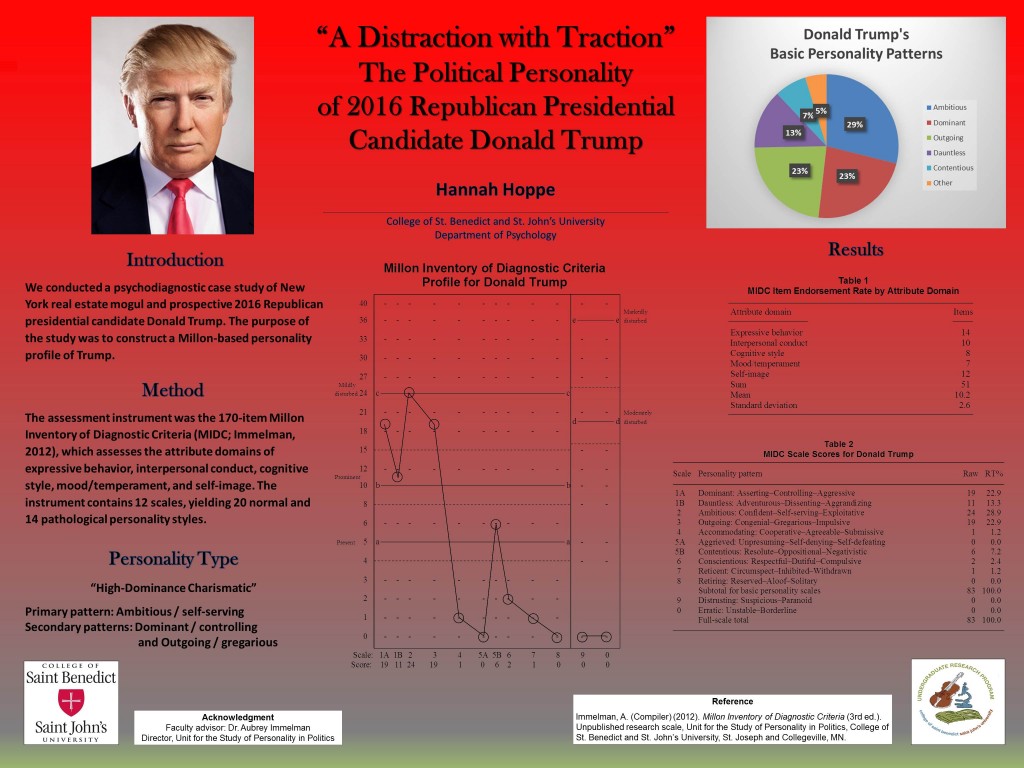
Click on image for larger view
Excerpt: A psychological analysis of real estate developer and television celebrity Donald Trump — a contender for the Republican nomination in the 2016 presidential election — by Hannah Hoppe and Aubrey Immelman, Ph.D., at the Unit for the Study of Personality in Politics, revealed that Trump’s predominant personality pattern is Ambitious / self-serving (a measure of narcissism) with secondary features of the Dominant / controlling and Outgoing / gregarious patterns. In summary, Trump’s personality composite can be characterized as a high-dominance charismatic.
The Personality Profile of 2016 Republican Presidential Candidate Jeb Bush (Aug. 2, 2015)
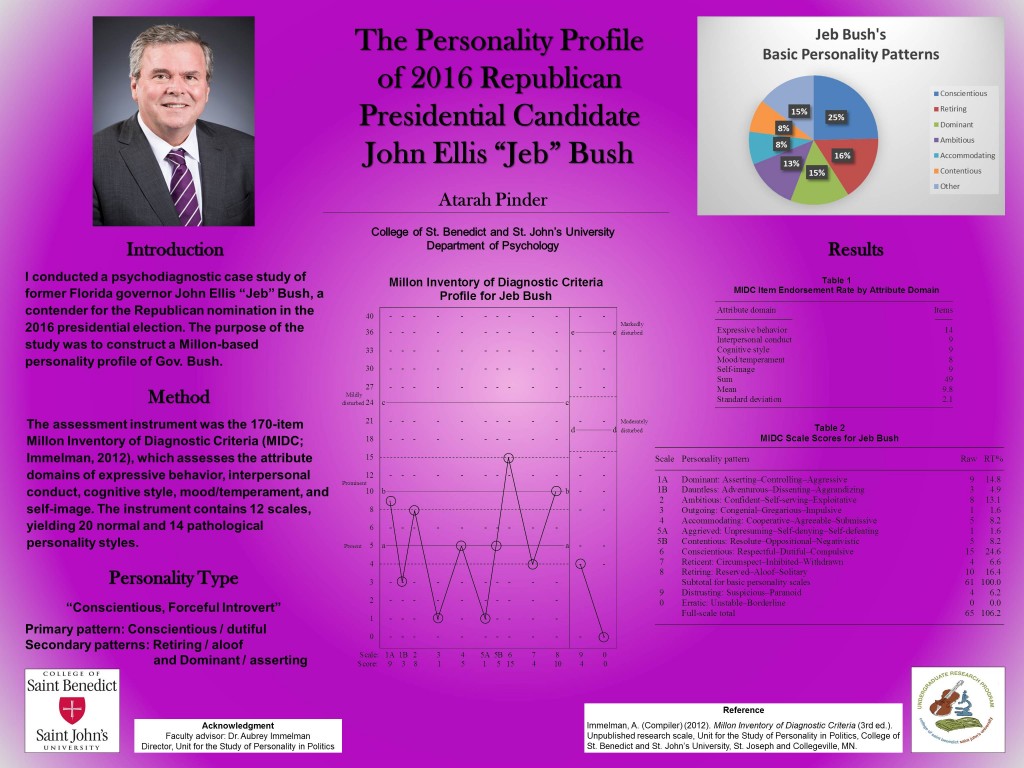
Click on image for larger view
Excerpt: A psychological analysis of former Florida governor Jeb Bush — a contender for the Republican nomination in the 2016 presidential election — by Atarah Pinder and Aubrey Immelman, Ph.D., at the Unit for the Study of Personality in Politics, revealed that Bush’s predominant personality pattern is Conscientious / dutiful and Retiring / aloof, with secondary Dominant / asserting features. In summary, Bush’s personality composite can be characterized as a conscientious, forceful introvert.
Why Mitt Romney Won’t Be President — In Theory (Oct. 29, 2012)

Aubrey Immelman and Andrew Obritsch in Chicago at the annual scientific meeting of the International Society of Political Psychology to present their research on Barack Obama and Mitt Romney, July 2012.
Excerpt: A heuristic model developed at the Unit for the Study of Personality in Politics to predict the winner of the presidential election prior to Super Tuesday indicates that Democratic incumbent President Barack Obama will defeat Republican challenger Gov. Mitt Romney in the November 6, 2012 U.S. presidential election.
Personality Matters: Mitt Romney Has Al Gore Problem
(Jan. 16, 2012)
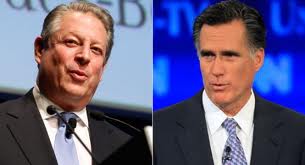
Photo composite: The Moderate Voice
Excerpt: Dana Milbank’s Washington Post opinion column outlining Mitt Romney’s personal shortcomings as a presidential candidate is congruent with my assessment that Mitt Romney lacks the personality qualities necessary to successfully challenge Barack Obama in the 2012 presidential election. Specifically, Romney’s score of 6 on the Personal Electability Index (which has accurately predicted the outcome of every presidential election since 1996), ranks near the bottom among presidential candidates evaluated in the past four presidential election cycles.
Obama Campaign Tilting at Romney Windmill (Aug. 9, 2011)

Excerpt: The Obama campaign would be misguided if it diverted inordinate resources to fending off Mitt Romney as Barack Obama’s likely opponent. Despite being the early front-runner in public opinion polls, Romney is unlikely to be the Republican presidential nominee — or, if he is, to be a viable challenger to Barack Obama. … Specifically, Romney’s score of 6 on the Personal Electability Index (PEI), which has accurately predicted the outcome of every presidential election since 1996, ranks near the bottom among presidential candidates I’ve studied in the past four presidential election cycles — slightly lower than John Kerry’s PEI score of 9 (though considerably better than Al Gore’s -17).
Why Mitt Romney Won’t Win (May 12, 2011)
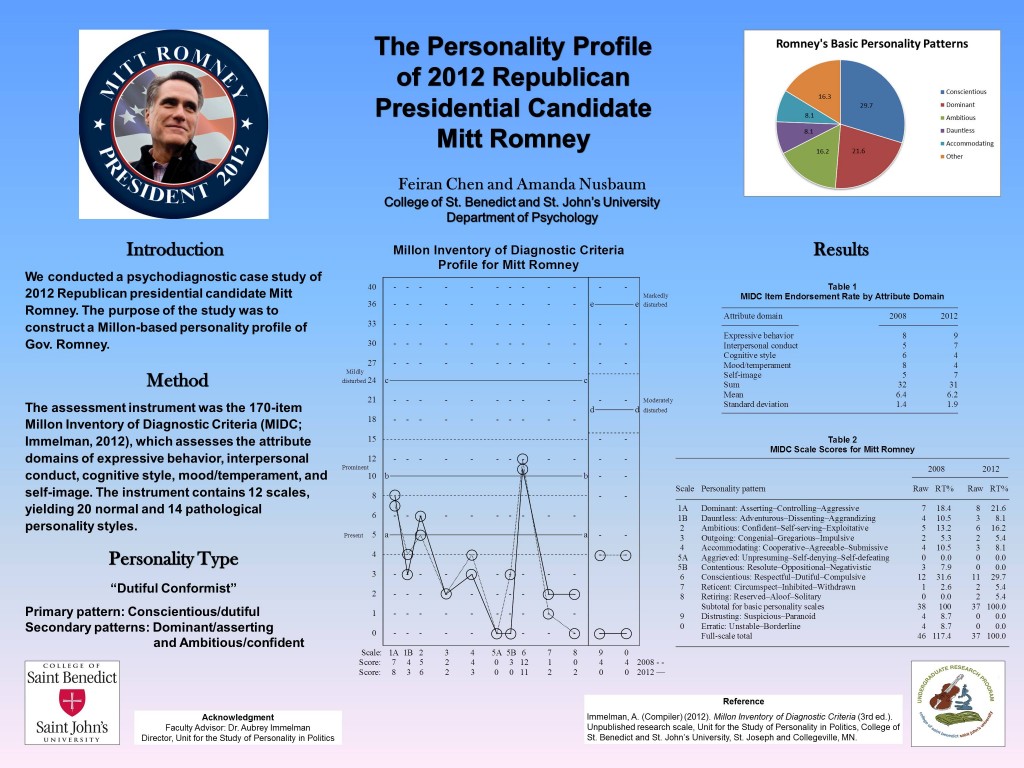
Click on image for larger view
Excerpt: A psychological analysis of former Massachusetts governor Mitt Romney– a contender for the Republican nomination in the 2012 presidential election — by Feiran Chen, Amanda Nusbaum, and Aubrey Immelman, Ph.D., at the Unit for the Study of Personality in Politics, revealed that Romney’s predominant personality pattern is Conscientious / dutiful, with secondary Dominant / asserting and Ambitious / confident features. In summary, Romney’s personality composite can be characterized as a dutiful conformist. The major implication of the study is that Romney lacks the personal appeal and political charisma, as measured by the Personal Electability Index for presidential contenders, to defeat President Barack Obama in the 2012 U.S. presidential election.
Leave a Reply
You must be logged in to post a comment.

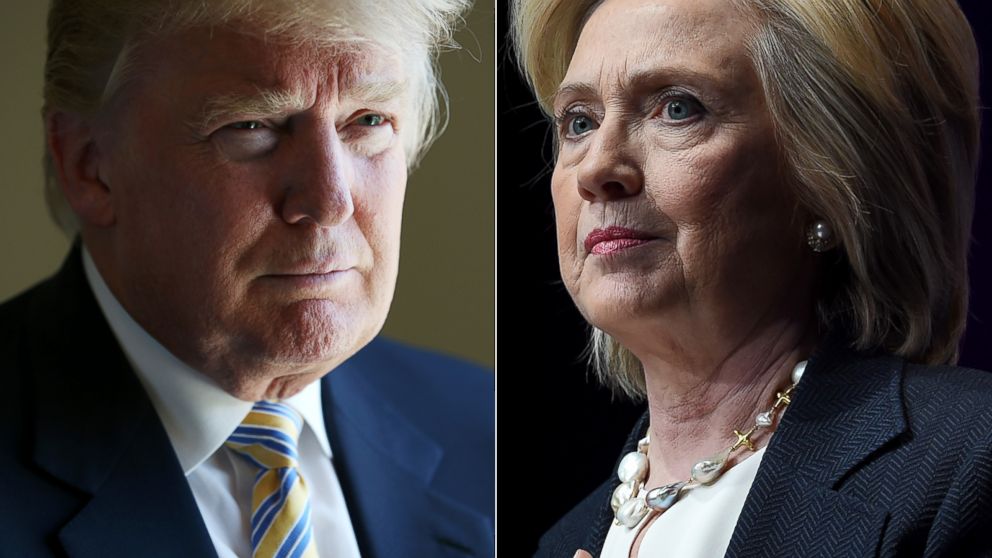

August 23rd, 2015 at 6:20 am
[…] Why Donald Trump Beats Jeb Bush: The Personal Electability Index (Aug. 23, 2015) […]
August 23rd, 2015 at 6:25 am
[…] Why Donald Trump Beats Jeb Bush: The Personal Electability Index (Aug. 23, 2015) […]
August 25th, 2015 at 10:02 pm
@FrankLuntz: “There has been genuine movement towards Trump and it’s because of his persona not his policies.” (@SeanHannity, Fox News, Aug. 25, 2015) » https://twitter.com/seanhannity/status/636361939883438080
August 30th, 2015 at 9:48 am
[…] Why Donald Trump Beats Jeb Bush: The Personal Electability Index (Aug. 23, 2015) […]
September 5th, 2015 at 4:19 pm
[…] Why Donald Trump Beats Jeb Bush: The Personal Electability Index […]
September 6th, 2015 at 8:47 am
[…] Why Donald Trump Beats Jeb Bush: The Personal Electability Index […]
September 7th, 2015 at 6:24 am
[…] Why Donald Trump Beats Jeb Bush: The Personal Electability Index […]
September 7th, 2015 at 6:46 am
[…] How Hillary Clinton Stacks Up Against Donald Trump and Jeb Bush: The Personal Electability Index […]
February 14th, 2016 at 10:19 am
[…] Why Donald Trump Beats Jeb Bush: The Personal Electability Index […]
February 29th, 2016 at 8:37 pm
[…] Why Donald Trump Beats Jeb Bush: The Personal Electability Index […]
March 3rd, 2016 at 7:46 am
[…] Why Donald Trump Beats Jeb Bush: The Personal Electability Index […]
March 24th, 2016 at 4:56 pm
[…] Related » Why Donald Trump Beats Jeb Bush: The Personal Electability Index […]
April 18th, 2016 at 8:30 pm
[…] John Kasich scores relatively low on the Millon Inventory of Diagnostic Criteria-based Personal Electability Index, which has accurately predicted the outcome of every presidential election since 1996. […]
April 21st, 2016 at 6:29 am
[…] Bernie Sanders scores relatively low on the Millon Inventory of Diagnostic Criteria-based Personal Electability Index, which has accurately predicted the outcome of every presidential election since 1996. […]
May 10th, 2016 at 8:09 pm
Cross-posted from the St. Cloud Times at http://www.sctimes.com/story/opinion/2016/05/10/trump-sanders-signal-revolution/84175800/
“Some pundits see the success of Trump and Sanders at the polls as a result of the failure of the two political parties. I see it as a national revolution that has to be taken seriously by all.” (Columnist Dick Andzenge)
Although I do not fundamentally disagree with the author’s thesis, I’d like to point out that I construed Donald Trump’s success in terms of his personality characteristics — not failure of the political parties or voter anger — as early as last summer while conducted empirical research on the personality traits of the Republican presidential candidates.
Upon submitting a “Your Turn” column to the St. Cloud Times reporting my findings regarding Trump, I remarked to the opinion page editor in an email dated August 20, 2015:
“I won’t be completely shocked if Trump wins it all.”
Here’s a link to the opinion column in question:
Why Bush Gets Trumped in the Polls » http://www.sctimes.com/story/opinion/2015/08/22/bush-gets-trumped-polls/32191941/
May 10th, 2016 at 8:17 pm
Cross-posted from the St. Cloud Times at http://www.sctimes.com/story/opinion/2016/05/10/trump-sanders-signal-revolution/84175800/
Here’s a link to March 1, 2016 St. Cloud Times article reporting on my projection, before Super Tuesday, that Donald Trump would beat Hillary Clinton in the November presidential election, based solely on their respective personality traits:
Professor Predicts Trump Would Beat Clinton » http://www.sctimes.com/story/news/local/2016/03/01/csbsju-professor-predicts-trump-would-beat-clinton/81150706/
July 27th, 2016 at 9:21 am
[…] Hillary Clinton scores high on the Millon Inventory of Diagnostic Criteria-based Personal Electability Index, which has accurately predicted the outcome of every presidential election since 1996. […]
July 30th, 2016 at 2:15 pm
[…] In contrast to the conventional wisdom, the Personal Electability Index (PEI) projected as early as August 2015 that Donald Trump would defeat Hillary Clinton. […]
July 1st, 2019 at 9:29 pm
[…] Why Donald Trump Beats Jeb Bush: The Personal Electability Index (Aug. 23, 2015) […]